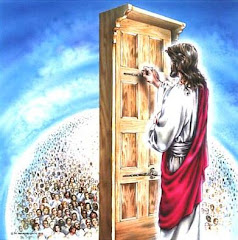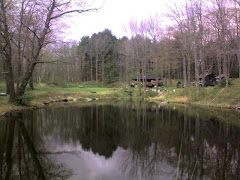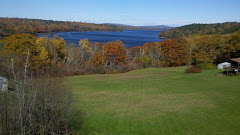"Vanity of vanities all is vanity". Such was the famous conclusion of King Solomon to the question of the meaning of life.
Shortly after he succeeded his father David as King of Israel, Solomon found favor in the eyes of God. And one day, God spoke to Solomon and said, "Ask of me anything your heart desires and I will give it to you."
Solomon thought and said. "Lord, you have raised me up to be king of Israel. My only desire is that you give me wisdom to serve you well as king of your people."
That answer impressed God, and he said, "Solomon, Because you didn't ask for riches and honor, but asked for only wisdom to serve me well, I will give you greater wisdom than any man ever born, and I will also give you great riches and honor, more than any king would possess, before or after you."
After receiving these great gifts from God, Solomon not only ruled well and built a vast kingdom, but he used his God given wisdom to search out the meaning of life. His conclusion: "Vanity of vanities all is vanity."
That Hebrew word for "vanities" can also be translated, "meaningless". The word conveys the idea of a breath of air on a cold day, seen for a moment, and then, poof, it s gone.
Solomon tells us why all things are vanity. He says all of creation is like a big cosmic merry-go-round. Now, I'm pretty sure there weren't merry-go-rounds in Solomon's day, but it's a good metaphor of his description of the stage on which man's life runs its course; He notes how the sun rises and sets, waters flow continuously into the sea, the seasons keep turning, back and forth go the tides, everywhere we look, a never ending merry-go-round.
Moreover, man, and the works of man, are merely the merry-go-round riders, going up and down, up and down, as we mimic the merry-go-round upon which we ride. I say mimic because as Solomon says, "there is nothing new under the sun, all that has been done is all that will be done, and there is no remembrance of earlier things, and things that will come to pass, there will be no remembrance of them either ". And all the while, man is just striving after the wind, even as he is perishing.
But before Solomon came to these conclusions, he experimented. For example, Solomon pursued the life of pleasure, but first he began drinking wine in hopes of seeing through the eyes of those who seek after such things. But God's wisdom never left him. And, as he vigorously pursued wine, woman and song, Solomon saw that the laughter along that way was madness and the pleasure, fleeting.
The experiment continued. Solomon built for himself palaces, planted vineyards, gardens, parks, forests, possessed great herds of flocks and amassed great gold and silver. And the bible says, of all that Solomon s eyes desired, he did not refuse them. After all that experimentation, Solomon concluded that all was vanity. Everything is, in today s vernacular, the same old same old, and it all perishes. Man's activity is just striving after the wind, meaning that nothing satisfies.
Solomon concluded that there is no meaning of life under the sun and looked for clues to the meaning of life from the other side of the sun.
Solomon saw four such clues. First, Solomon sees that all these meaningless activities of the merry-go-round, such as a time for war, a time for peace, a time for building up, a time for tearing down, a time to give birth, a time to die and so forth are, ironically, just as God intended them to be.
Second, Solomon sees one activity of man on the merry-go-round as being from the "hand of God", in that, it hints of the meaning of life. He says: Here is what I have seen to be good and fitting: to eat, to drink and enjoy oneself in all one's labor in which he toils under the sun during the few years of his life which God has given him."
Third, Solomon notes that God has set eternity in the heart of man, yet in such a way that he cannot be satisfied with any of the merriment of the great merry-go-round of creation and life.
Finally, Solomon sees that God is like a shepherd, who seeks those who are perishing on the merry-go-round, and so tosses us a life line from the other side of the sun. That life line is his word that adjures fallen man to simply heed God and follow in his ways.
That is where the record of Solomon s search for the meaning of life ends. He concludes there is no meaning of life under the sun. Meaning comes from the other side of the sun, from where God dwells. But the picture is incomplete. The search for the complete meaning of life is to be continued...
Has God more to say to us about the meaning of life. Let s fast forward a thousand years past Socrates, Plato, and Aristotle to the time of the New Testament, and sure enough, we read in the gospel of Matthew that there walked among us, one with greater wisdom than even Solomon, and that one was Jesus. Now, when we connect the dots of the words of Solomon with the words of Jesus, we can see a more complete picture of the meaning of life.
As previously noted, Solomon saw that God has put eternity in the heart of man, so that man's heart can only be satisfied by the word of God. In the gospel of John, we see Jesus saying to the woman at the well, "Anybody who drinks of this water (pointing to the well water), will thirst again, but whoever drinks of the water I give shall never thirst, but the water that I will give him will become in him a well of water springing up to eternal life."
Later that day when his disciples were urging him to eat something, Jesus said: "I have bread to eat that you do not know about. My bread is to do the will of Him who sent me and to accomplish His work."
You see, in both these stories, water and bread are symbols of the word of God, as they are elsewhere in the bible. Jesus is telling us that it is only the words of God that he has brought down from heaven that satisfies the eternity that God has put into our hearts. Solomon s picture of the meaning of life becomes clearer.
Also, remember that Solomon saw the activity of eating and drinking and enjoying one's labor as a clue to the unseen meaning of life. And so, Jesus reveals to us the two works of God that are necessary for man to walk in God's ways of fulfillment and satisfaction; works so simple that a child can understand and accomplish them. They are, first, to believe on him who God has sent down from heaven with the good news of salvation, and second, to love one another.
And finally, in the book of Revelation chapter three, we see Jesus giving fallen man an invitation to eat and drink with him. This invitation can be paraphrased in terms of Solomon's search for the meaning of life as: "Behold, I am knocking on the door of your heart from the other side of the sun, if you open that door and receive me by faith, I will come in and bring with me living waters and the bread of life that fully satisfy. And you will then know, live and share in the joyful labors of the meaning of life."
Shortly after he succeeded his father David as King of Israel, Solomon found favor in the eyes of God. And one day, God spoke to Solomon and said, "Ask of me anything your heart desires and I will give it to you."
Solomon thought and said. "Lord, you have raised me up to be king of Israel. My only desire is that you give me wisdom to serve you well as king of your people."
That answer impressed God, and he said, "Solomon, Because you didn't ask for riches and honor, but asked for only wisdom to serve me well, I will give you greater wisdom than any man ever born, and I will also give you great riches and honor, more than any king would possess, before or after you."
After receiving these great gifts from God, Solomon not only ruled well and built a vast kingdom, but he used his God given wisdom to search out the meaning of life. His conclusion: "Vanity of vanities all is vanity."
That Hebrew word for "vanities" can also be translated, "meaningless". The word conveys the idea of a breath of air on a cold day, seen for a moment, and then, poof, it s gone.
Solomon tells us why all things are vanity. He says all of creation is like a big cosmic merry-go-round. Now, I'm pretty sure there weren't merry-go-rounds in Solomon's day, but it's a good metaphor of his description of the stage on which man's life runs its course; He notes how the sun rises and sets, waters flow continuously into the sea, the seasons keep turning, back and forth go the tides, everywhere we look, a never ending merry-go-round.
Moreover, man, and the works of man, are merely the merry-go-round riders, going up and down, up and down, as we mimic the merry-go-round upon which we ride. I say mimic because as Solomon says, "there is nothing new under the sun, all that has been done is all that will be done, and there is no remembrance of earlier things, and things that will come to pass, there will be no remembrance of them either ". And all the while, man is just striving after the wind, even as he is perishing.
But before Solomon came to these conclusions, he experimented. For example, Solomon pursued the life of pleasure, but first he began drinking wine in hopes of seeing through the eyes of those who seek after such things. But God's wisdom never left him. And, as he vigorously pursued wine, woman and song, Solomon saw that the laughter along that way was madness and the pleasure, fleeting.
The experiment continued. Solomon built for himself palaces, planted vineyards, gardens, parks, forests, possessed great herds of flocks and amassed great gold and silver. And the bible says, of all that Solomon s eyes desired, he did not refuse them. After all that experimentation, Solomon concluded that all was vanity. Everything is, in today s vernacular, the same old same old, and it all perishes. Man's activity is just striving after the wind, meaning that nothing satisfies.
Solomon concluded that there is no meaning of life under the sun and looked for clues to the meaning of life from the other side of the sun.
Solomon saw four such clues. First, Solomon sees that all these meaningless activities of the merry-go-round, such as a time for war, a time for peace, a time for building up, a time for tearing down, a time to give birth, a time to die and so forth are, ironically, just as God intended them to be.
Second, Solomon sees one activity of man on the merry-go-round as being from the "hand of God", in that, it hints of the meaning of life. He says: Here is what I have seen to be good and fitting: to eat, to drink and enjoy oneself in all one's labor in which he toils under the sun during the few years of his life which God has given him."
Third, Solomon notes that God has set eternity in the heart of man, yet in such a way that he cannot be satisfied with any of the merriment of the great merry-go-round of creation and life.
Finally, Solomon sees that God is like a shepherd, who seeks those who are perishing on the merry-go-round, and so tosses us a life line from the other side of the sun. That life line is his word that adjures fallen man to simply heed God and follow in his ways.
That is where the record of Solomon s search for the meaning of life ends. He concludes there is no meaning of life under the sun. Meaning comes from the other side of the sun, from where God dwells. But the picture is incomplete. The search for the complete meaning of life is to be continued...
Has God more to say to us about the meaning of life. Let s fast forward a thousand years past Socrates, Plato, and Aristotle to the time of the New Testament, and sure enough, we read in the gospel of Matthew that there walked among us, one with greater wisdom than even Solomon, and that one was Jesus. Now, when we connect the dots of the words of Solomon with the words of Jesus, we can see a more complete picture of the meaning of life.
As previously noted, Solomon saw that God has put eternity in the heart of man, so that man's heart can only be satisfied by the word of God. In the gospel of John, we see Jesus saying to the woman at the well, "Anybody who drinks of this water (pointing to the well water), will thirst again, but whoever drinks of the water I give shall never thirst, but the water that I will give him will become in him a well of water springing up to eternal life."
Later that day when his disciples were urging him to eat something, Jesus said: "I have bread to eat that you do not know about. My bread is to do the will of Him who sent me and to accomplish His work."
You see, in both these stories, water and bread are symbols of the word of God, as they are elsewhere in the bible. Jesus is telling us that it is only the words of God that he has brought down from heaven that satisfies the eternity that God has put into our hearts. Solomon s picture of the meaning of life becomes clearer.
Also, remember that Solomon saw the activity of eating and drinking and enjoying one's labor as a clue to the unseen meaning of life. And so, Jesus reveals to us the two works of God that are necessary for man to walk in God's ways of fulfillment and satisfaction; works so simple that a child can understand and accomplish them. They are, first, to believe on him who God has sent down from heaven with the good news of salvation, and second, to love one another.
And finally, in the book of Revelation chapter three, we see Jesus giving fallen man an invitation to eat and drink with him. This invitation can be paraphrased in terms of Solomon's search for the meaning of life as: "Behold, I am knocking on the door of your heart from the other side of the sun, if you open that door and receive me by faith, I will come in and bring with me living waters and the bread of life that fully satisfy. And you will then know, live and share in the joyful labors of the meaning of life."







